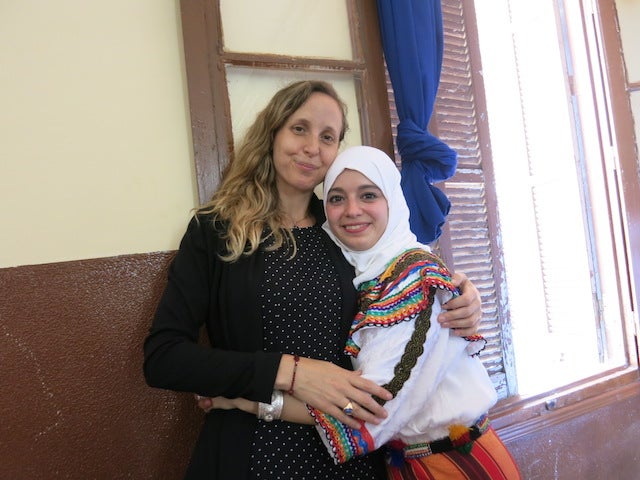Delia Dunlap served as an English Language Fellow in Nouackchott, Mauritania and in Algiers, Algeria. Teaching as a Fellow in Mauritania and Algeria provided invaluable lessons on culture and different teaching perspectives for both Delia and her students overseas. “I loved working with my host-country institutions, particularly the students, because they had never met a teacher who taught in a student-centered classroom before and the experience of seeing the same group of students every week enabled me to challenge my students to think differently about teaching and learning.” 
One of the highlights of Delia’s work was traveling with and training a group of teacher trainers in Mauritania. “We went to six very remote villages and led an intensive program of camp activities, painted a mural at each school and modeled interactive, student-friendly teaching strategies for the teachers and students. It was an incredible experience,” Delia says.
A particularly exciting project for Delia was securing grant funding for an Innovation-R Fund project to train youth from nine different Algerian youth associations on how to produce professional-quality radio broadcasts. “I led team-building activities every evening after the training ended to facilitate a strong sense of collaboration and teamwork among the team. After the training, I traveled throughout Algeria to help the trainees become trainers and train 25-50 additional association members from each association,” Delia explains. “The project is still running today and the members remain active and engaged young trainers and radio content producers.”
 The English Language Fellow Program provided Delia with the time, funds, and opportunity to plan and execute projects like the Mauritania camp and Algerian podcast project. Delia “loved the balance of the independence I had to design my courses, create projects, and plan activities while also being connected to the Public Affairs Section [at the U.S. Embassy] and having their support, resources, ideas, and political good-will that enabled me to make my ideas become a reality.”
The English Language Fellow Program provided Delia with the time, funds, and opportunity to plan and execute projects like the Mauritania camp and Algerian podcast project. Delia “loved the balance of the independence I had to design my courses, create projects, and plan activities while also being connected to the Public Affairs Section [at the U.S. Embassy] and having their support, resources, ideas, and political good-will that enabled me to make my ideas become a reality.”
Challenges related to gender expectations in a society with different cultural norms were difficult, but Delia’s positive attitude helped her overcome them. “Positive thinking can open doors that seem closed and helped me bridge differences of opinion in order to find solutions. These challenges helped me to become more patient, self-reliant, and creative,” Delia said.
That creativity came in handy when Delia began her fellowship in a place very different from the home she was used to in the United States. “The most amazing part of my experience was integrating into the communities where I lived and forming strong friendships with my colleagues and students. After living in remote locations for six years, I am a changed person,” Delia says. This experience of forming and nurturing a community of professional and personal relationships in two different areas of the world helped Delia develop an empathetic worldview. “I am part of the world and there are people just like me in every corner of the planet. I have a responsibility to look out for my fellow global citizens and to care about what is happening around the world.” 
After spending six years teaching abroad, Delia is back in the United States and is currently teaching high school students ESOL and U.S. History at a high school for newcomer immigrants in Prince George’s County, Maryland. Delia feels fortunate to continue to use the cross-cultural and language skills she gained from her fellowship every day. “The Fellow Program showed me that with a little creativity, I can create and realize any project I can imagine. It is empowering to know that anything is possible. This experience has helped me to become a more confident teacher— I can teach anywhere, in any conditions and I can thrive and inspire generations of students.” Now that Delia is back in the United States, she is immersed in a resource-rich environment. When asked how it is different from her fellowships, Delia responded, “I love using the latest technology in the classroom but when the Internet stops working, I have an immense bag of tricks that I learned from my fellowship to rely on. To be a good teacher, I need to be willing to grow and change so that I can keep my teaching practices relevant and meaningful to my students and I gained a tremendous range of teaching strategies as an English Language Fellow.”

